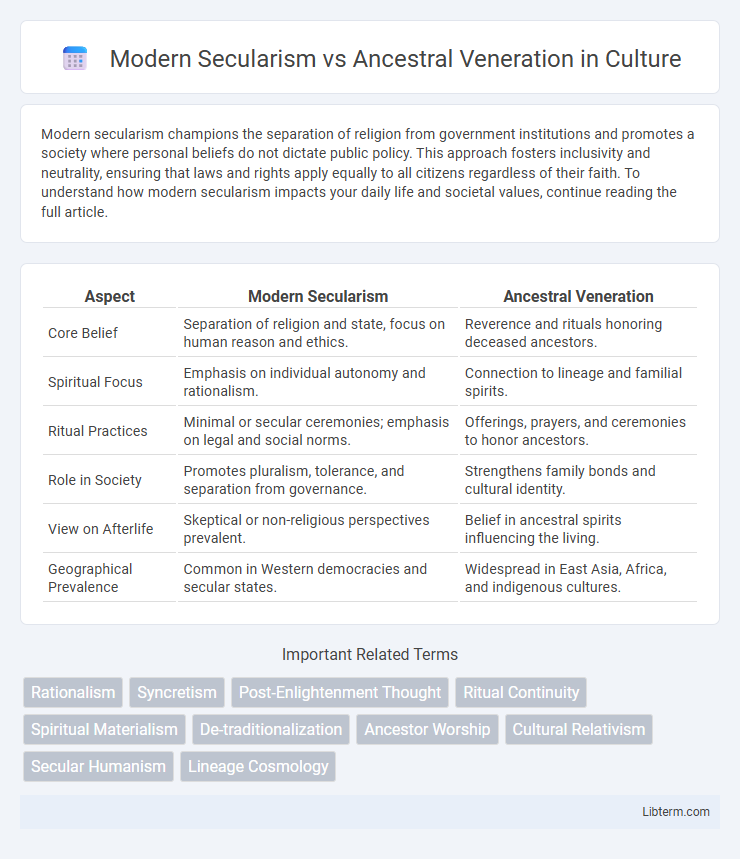Modern secularism champions the separation of religion from government institutions and promotes a society where personal beliefs do not dictate public policy. This approach fosters inclusivity and neutrality, ensuring that laws and rights apply equally to all citizens regardless of their faith. To understand how modern secularism impacts your daily life and societal values, continue reading the full article.
Table of Comparison
| Aspect | Modern Secularism | Ancestral Veneration |
|---|---|---|
| Core Belief | Separation of religion and state, focus on human reason and ethics. | Reverence and rituals honoring deceased ancestors. |
| Spiritual Focus | Emphasis on individual autonomy and rationalism. | Connection to lineage and familial spirits. |
| Ritual Practices | Minimal or secular ceremonies; emphasis on legal and social norms. | Offerings, prayers, and ceremonies to honor ancestors. |
| Role in Society | Promotes pluralism, tolerance, and separation from governance. | Strengthens family bonds and cultural identity. |
| View on Afterlife | Skeptical or non-religious perspectives prevalent. | Belief in ancestral spirits influencing the living. |
| Geographical Prevalence | Common in Western democracies and secular states. | Widespread in East Asia, Africa, and indigenous cultures. |
Defining Modern Secularism: Principles and Practices
Modern secularism centers on the separation of religion from governmental institutions, ensuring laws and policies are based on reason and universally applicable principles rather than religious doctrines. It promotes individual freedom of belief and expression, supporting a pluralistic society where diverse worldviews coexist without state endorsement of any particular religion. Key practices include secular education, legal neutrality in religious matters, and public spheres free from overt religious influence, distinguishing it sharply from ancestral veneration, which intertwines spiritual reverence with cultural heritage and communal identity.
Ancestral Veneration: Origins and Meaning
Ancestral veneration, rooted in ancient cultural traditions, involves honoring deceased forebears through rituals and offerings to maintain spiritual connection and community identity. This practice originates from early human societies' belief in the ongoing influence of ancestors on the living, reflecting a worldview where family lineage and ancestry play a central role in moral guidance and social cohesion. Unlike modern secularism, which prioritizes rationalism and the separation of religion from public life, ancestral veneration emphasizes continuity, reverence for heritage, and the sacredness of familial bonds.
Philosophical Foundations: Rationalism vs. Reverence
Modern secularism is grounded in rationalism, emphasizing empirical evidence, reason, and individual autonomy as the basis for knowledge and ethics. In contrast, ancestral veneration is rooted in reverence, valuing tradition, spiritual connection, and collective memory as essential for cultural identity and moral guidance. This philosophical divergence highlights a shift from faith in transcendental ancestral wisdom to trust in human intellect and scientific inquiry.
The Role of Tradition in Shaping Belief Systems
Modern secularism emphasizes rational thought and empirical evidence, distancing itself from supernatural or ancestral influences in shaping belief systems. Ancestral veneration deeply integrates traditions, where rituals and reverence for forebears form the foundation of cultural identity and moral values. The persistence of ancestral practices underscores tradition's role in preserving community cohesion and transmitting ethical frameworks across generations.
Impact on Community and Social Cohesion
Modern secularism promotes community and social cohesion through inclusive public policies and emphasis on shared civic values, reducing religious or ancestral biases. Ancestral veneration reinforces social bonds by preserving cultural heritage and collective memory, fostering a strong sense of identity and belonging within communities. The tension between secularism and ancestral veneration often shapes social dynamics, influencing how communities balance tradition with contemporary pluralism.
Ethics and Morality: Secular vs. Ancestral Perspectives
Modern secularism grounds ethics and morality in reason, human rights, and empirical evidence, emphasizing individual autonomy and universal principles. Ancestral veneration derives moral guidance from traditions, rituals, and the wisdom of forebears, prioritizing communal harmony and respect for lineage. The secular perspective values ethical flexibility and progress, while ancestral morality centers on continuity and the sacredness of inherited norms.
Rituals, Symbols, and Cultural Continuity
Modern secularism emphasizes rationality and individual autonomy, often minimizing ritualistic practices and symbolic traditions to foster a universal cultural framework. In contrast, ancestral veneration centers on elaborate rituals and sacred symbols that reinforce cultural continuity and communal identity across generations. These practices preserve collective memory and transmit values, securing a strong intergenerational connection rooted in historical and spiritual significance.
Science, Spirituality, and the Question of Legacy
Modern secularism emphasizes empirical science and rational inquiry, prioritizing evidence-based understanding of the world while often sidelining spiritual beliefs and ancestral veneration. In contrast, ancestral veneration integrates spirituality and reverence for lineage, viewing legacy as a continuous, living connection with forebears that shapes identity and moral guidance beyond material existence. The tension between these perspectives highlights differing approaches to legacy: secularism seeks progress through scientific innovation, whereas ancestral veneration values preserving cultural memory and spiritual inheritance.
Challenges of Modernization and Cultural Retention
Modern secularism often challenges ancestral veneration by promoting rationality and individualism, which can undermine traditional beliefs and communal rituals deeply rooted in cultural identity. The rapid pace of modernization leads to diminished participation in ancestral rites as younger generations prioritize contemporary lifestyles and global values. Efforts to retain cultural heritage face obstacles such as urbanization, technological distractions, and changing social norms that dilute the significance of ancestral practices.
Future Implications: Bridging Secular and Ancestral Values
Modern secularism, emphasizing rational governance and individual rights, often contrasts with ancestral veneration's focus on tradition and communal bonds rooted in lineage. Future societal frameworks may benefit from integrating secular principles with respect for ancestral wisdom, fostering social cohesion and ethical continuity. Embracing hybrid models can bridge generational divides, enriching cultural identity while upholding inclusivity and progress.
Modern Secularism Infographic

 libterm.com
libterm.com